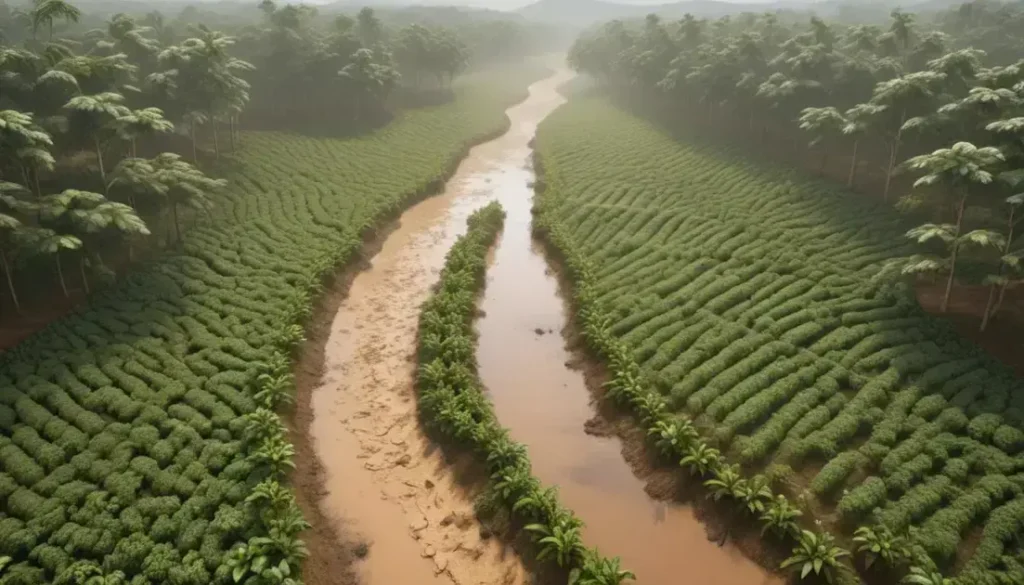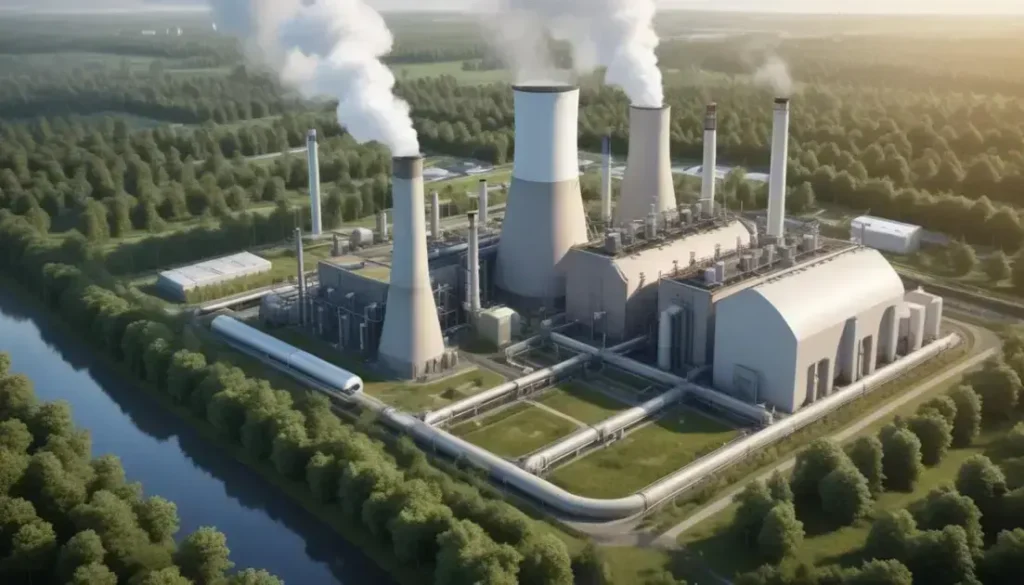Climate change is significantly impacting coffee production by altering weather patterns, leading to reduced yields and quality, while sustainable practices and technology are essential for maintaining the viability and resilience of the coffee industry.
In recent times, the impact of climate change on global supply chains has become a pressing issue, especially for industries like coffee. Southern India coffee exporters might want to pay close attention to these developments.
Understanding climate change’s role in coffee production
Climate change plays a critical role in coffee production, influencing factors such as temperatures and rainfall patterns. These changes create unpredictable growing conditions that can significantly impact coffee yields.
Regions that have traditionally been optimal for coffee cultivation are now finding it increasingly difficult to sustain production levels. Rising temperatures can lead to spikes in pests and diseases that threaten coffee plants, further complicating the harvest for farmers.
Additionally, global warming alters precipitation patterns, causing droughts in some areas and excessive rainfall in others. Such variability leads to reduced quality and quantity of coffee beans, affecting prices in the global market. Farmers in regions like southern India must adapt to these new realities by exploring sustainable practices.
Implementing strategies such as shade-grown coffee or organic farming can help mitigate some effects of climate change. These methods not only protect crops but enhance biodiversity, proving beneficial for the environment and providing consumers with high-quality coffee.
Current trends in coffee prices: Arabica vs Robusta
Understanding the differences between Arabica and Robusta is crucial for grasping current trends in coffee prices. Arabica beans, known for their smooth and aromatic flavor, generally command higher prices in the market. On the other hand, Robusta beans, which are stronger and more bitter, are priced lower, reflecting their higher yield and lower production costs.
Recent market fluctuations have highlighted how shifts in weather patterns and agricultural practices impact the prices of these two types. For instance, unfavorable conditions affecting Arabica production in major growing regions have led to price surges, creating a ripple effect on the global market.
Meanwhile, Robusta prices have remained relatively stable, primarily due to its resilience against climatic challenges. However, this trend could change if demand for specialty coffee continues to rise, pushing Robusta prices upward as producers seek to diversify their offerings.
As consumers become more discerning, the preference for premium quality coffee is likely to shape the dynamics between Arabica and Robusta prices further. Understanding these nuances allows coffee traders and farmers, especially in India, to make informed decisions and adjust their strategies accordingly.
Impact of global warming on coffee yields
Global warming poses significant challenges to coffee yields worldwide, affecting both the quantity and quality of beans produced. As temperatures continue to rise, traditional coffee-growing regions are increasingly facing conditions that are less than ideal for cultivation.
Higher temperatures can lead to a decrease in coffee yields, particularly in Arabica varieties, which are more sensitive to climate fluctuations. Many regions reliant on coffee farming may experience reduced harvests as plants struggle to thrive under excessive heat and unreliable rainfall.
In addition to temperature changes, the rise in pests and diseases directly linked to global warming threatens coffee crops. Warmer conditions create an environment conducive to the proliferation of pests like the coffee borer beetle, leading to increased agricultural losses. Farmers are pressured to adopt costly measures to manage these threats.
Moreover, unpredictable weather patterns can disrupt flowering and fruiting cycles, further complicating production. As conditions worsen, farmers in regions like India must adapt by selecting more resilient coffee crops or altering their farming practices.
Investing in research and technology to develop heat-resistant coffee plants could provide long-term solutions for sustainability, ensuring that coffee production remains viable in an era of changing ecosystems.
Case study: Brazil’s climate challenges
Brazil, the world’s largest coffee producer, faces significant climate challenges that threaten its coffee industry. The country’s diverse geography allows for varied coffee cultivation, but rising temperatures and changing rain patterns jeopardize this delicate balance.
Specifically, regions like Minas Gerais, which are famously recognized for their high-quality Arabica beans, have been experiencing increased episodes of drought. These dry spells curtail water availability, impacting the growth cycle of coffee plants and decreasing overall yield.
Moreover, the threat from pests and diseases escalates with warmer conditions. The coffee borer beetle, an unwelcome adversary, thrives in mild climates, wreaking havoc on coffee crops and forcing farmers to employ costly pest control measures.
Adapting to these challenges requires innovative approaches. Brazilian coffee farmers are now experimenting with climate-resilient coffee varieties and shifting planting strategies to optimize resources. By employing techniques such as planting cover crops, they enhance soil health and moisture retention.
This case study illustrates the pressing need for sustainable practices and informed strategies to ensure a stable and profitable coffee production in Brazil amidst the looming threat of climate change.
Vietnam’s Robusta production dips due to drought
Vietnam, a leading producer of Robusta coffee, is currently experiencing a significant dip in production due to prolonged drought conditions. The adverse weather has resulted in a decrease in yield, impacting both local farmers and the global coffee market.
Robusta coffee, known for its stronger flavour and higher caffeine content, is predominantly grown in the Central Highlands of Vietnam. The recent lack of rainfall has stressed the plants, leading to smaller beans and reduced overall harvest. Farmers face challenges securing adequate water for irrigation, critical for maintaining healthy crops during dry spells.
This situation not only threatens the livelihoods of many farmers but also affects coffee prices globally. With the demand for Robusta rising, particularly from instant coffee manufacturers, the decline in production creates a precarious balance between supply and demand.
In response, Vietnamese farmers are being urged to adopt more sustainable and resilient farming practices. This includes implementing water conservation techniques and exploring drought-resistant coffee varieties to mitigate the impacts of climate change on coffee production.
Addressing these challenges effectively is crucial for Vietnam to maintain its position as a key player in the global coffee industry while ensuring the sustainability of its coffee farming communities.
Future projections for coffee supply chains
The future of coffee supply chains is likely to be shaped by various factors, including climate change, technological advancements, and shifts in consumer demand. As weather patterns continue to evolve, coffee producers must adapt to maintain yields and quality.
One key projection is the integration of technology in agriculture. Innovations such as precision farming and data analytics will enable farmers to optimize their practices, leading to improved crop management. These technologies can help monitor weather conditions, soil health, and water availability, allowing for timely interventions.
Another aspect is the potential shift towards sustainable practices. Consumers are increasingly demanding ethically sourced and environmentally friendly products. This trend forces producers to consider sustainability in their operations, which could involve transparency in production processes and responsible sourcing of materials.
Moreover, with the growth of global markets and changing consumer preferences, coffee supply chains may become more diversified. This can lead to partnerships and collaborations among countries, enabling a more resilient supply network to withstand challenges such as climate variability or economic disruptions.
In summary, the future of coffee supply chains will depend on the ability of producers to adapt to environmental changes while embracing technological and sustainable practices to meet the evolving demands of the global market.
How Indian exporters can adapt
Indian coffee exporters face numerous challenges due to changing global dynamics and environmental factors. To ensure sustainability and growth, it is essential for these exporters to adapt effectively to the evolving market landscape.
One strategy is to embrace technology and innovation. Utilizing advanced analytics and data-driven tools can help exporters predict market trends, optimize logistics, and enhance quality control. Additionally, investing in sustainable farming practices can improve yields and cater to the growing demand for environmentally friendly products.
Another approach involves diversifying supply chains. By establishing relationships with farmers across different regions, exporters can mitigate risks associated with climate variability and market fluctuations. Collaborating with local communities enhances resilience and ensures consistent product availability.
Furthermore, building strong brand identities around quality and sustainability can attract global buyers looking for premium Indian coffee. Engaging in direct trade and establishing closer connections with customers can also lead to better pricing and market positioning.
Lastly, staying informed about international regulations and quality certifications is crucial. Compliance with these standards can open doors to new markets and strengthen India’s position as a key coffee exporter.
Strategic plantation expansions in Brazil
Brazil is actively focusing on strategic plantation expansions to bolster its coffee industry amidst the challenges posed by climate change and market fluctuations. This initiative involves targeting regions that show potential for increased coffee cultivation, particularly in areas previously underutilized.
One primary focus is on the Central Highlands, where conditions are becoming increasingly favourable for sustainable coffee growth. Implementing modern agricultural practices in these areas can significantly enhance overall production quality and yield.
Additionally, the expansion strategy reflects a commitment to sustainability. By opting for environmentally friendly practices such as agroforestry, Brazil aims to not only increase coffee output but also preserve biodiversity and protect natural resources. This approach helps maintain soil health and supports local ecosystems.
Furthermore, collaboration with local farmers is essential in this expansion initiative. Training programs that educate farmers on best practices and innovative techniques can lead to a more resilient coffee production system. This grassroots approach ensures that the benefits of plantation expansion are shared widely within communities.
Overall, strategic plantation expansions in Brazil represent a forward-thinking response to current agricultural challenges, positioning the nation to meet future coffee demands while adhering to high environmental standards.
The role of technology in sustainable coffee sourcing
The role of technology in sustainable coffee sourcing is becoming increasingly vital as the industry faces the challenges of climate change and fluctuating market demands. Innovations in technology enable coffee producers to optimize their practices while minimizing environmental impacts.
One significant advancement is the use of data analytics. This technology helps farmers monitor crop health, soil conditions, and weather patterns, providing them with actionable insights. By using sensors and drones, farmers can efficiently manage resources like water and fertilizers, leading to sustainable agricultural practices.
Additionally, blockchain technology is transforming transparency in the coffee supply chain. By recording every step from farm to cup, blockchain ensures that consumers can trace the origins of their coffee. This not only builds trust with customers but also encourages ethical sourcing practices among producers.
Furthermore, apps and digital platforms are enabling farmers to connect directly with buyers, reducing reliance on intermediaries. This approach can lead to better pricing for farmers and offers consumers the opportunity to purchase high-quality, ethically sourced coffee.
In summary, integrating technology into coffee sourcing is crucial for promoting sustainability, improving efficiencies, and ensuring that both producers and consumers benefit from responsible practices.
Quotes from industry leaders on climate effects
Industry leaders in the coffee sector have been vocal about the impacts of climate change on coffee production. Their insights underscore the urgent need for action as climate-related challenges become increasingly pronounced.
One notable quote from a prominent coffee exporter states, “Climate change is not a distant threat; it is a current challenge impacting harvests and livelihoods right now. We must innovate and adapt to survive.” This sentiment resonates widely among producers who are witnessing shifts in traditional growing patterns.
Another leader in sustainable coffee sourcing emphasized, “Sustainability is no longer optional. It is essential for our survival. We must integrate sustainable practices to safeguard our farms for future generations.” This highlights the industry’s pivot towards responsible farming methods as an essential response to these challenges.
Furthermore, an executive from a leading coffee roasting company remarked, “As climate impacts intensify, our commitment to source coffee responsibly becomes more critical. We owe it to our farmers and consumers to ensure a secure supply chain.” This reflection illustrates the growing awareness among buyers about the interconnectedness of their supply chain and environmental sustainability.
These quotes reinforce the collective understanding that without immediate and coordinated efforts to tackle climate effects, the future of coffee production may be at risk.
Final thoughts on the future of coffee
The future of coffee is poised at a crossroads, with various factors shaping its trajectory. One significant influence is the ongoing impact of climate change. As weather patterns become less predictable, coffee producers must adapt and innovate to ensure consistent quality and supply.
Another key element is the increasing demand for sustainability. Consumers are becoming more conscious of the origins of their coffee, pushing brands to adopt ethical sourcing practices. This shift encourages farmers to implement more environmentally friendly methods, contributing to the overall health of the coffee ecosystem.
Technology will also play a crucial role in the future of coffee. From precision agriculture to blockchain tracking systems, advancements will enhance productivity and transparency throughout the supply chain. These innovations not only help farmers optimize their yields but also foster a stronger connection between producers and consumers.
Moreover, the global coffee market is expanding, leading to new opportunities for emerging coffee-producing regions. Countries like India may position themselves as significant players by adopting sustainable practices and fostering partnerships with international buyers.
Ultimately, the future of coffee hinges on collaboration among stakeholders. By working together to address the challenges of climate change and sustainability, the coffee industry can thrive and provide high-quality products for generations to come.
In summary, the future of coffee is bright yet challenging
As we look ahead, it is clear that the coffee industry must adapt to various changes. From climate change impacts to evolving consumer demands, the path forward requires innovation and sustainability.
Embracing technology will be crucial for coffee producers to remain competitive. By utilizing new farming methods and transparent supply chains, they can not only improve yields but also build trust with consumers.
Furthermore, collaboration among farmers, exporters, and consumers is key to addressing the challenges faced by the coffee industry. Together, they can foster a more resilient coffee market, ensuring that high-quality coffee continues to thrive for generations to come.
Ultimately, with awareness and collective effort, the coffee community can navigate the uncertainties and keep the love for coffee alive and well.
Frequently Asked Questions
How is climate change affecting coffee production?
Climate change impacts coffee production by altering weather patterns, leading to unpredictable rainfall and increased temperatures, which affect crop yields and quality.
What sustainable practices can coffee farmers adopt?
Coffee farmers can adopt sustainable practices such as agroforestry, water conservation, and organic farming to enhance biodiversity and reduce environmental impact.
How can technology improve coffee sourcing?
Technology improves coffee sourcing through data analytics, which helps monitor crop health, and blockchain for ensuring transparency in the supply chain.
What role do consumers play in sustainable coffee sourcing?
Consumers influence sustainable coffee sourcing by demanding ethically produced products, which encourages brands to adopt responsible sourcing practices.
How can Indian exporters adapt to market changes?
Indian exporters can adapt by embracing technology, diversifying supply chains, and focusing on building strong brand identities around quality and sustainability.
What does the future hold for the coffee industry?
The future of the coffee industry will focus on innovation, sustainability, and collaboration among stakeholders to address challenges like climate change and meet consumer demands.


